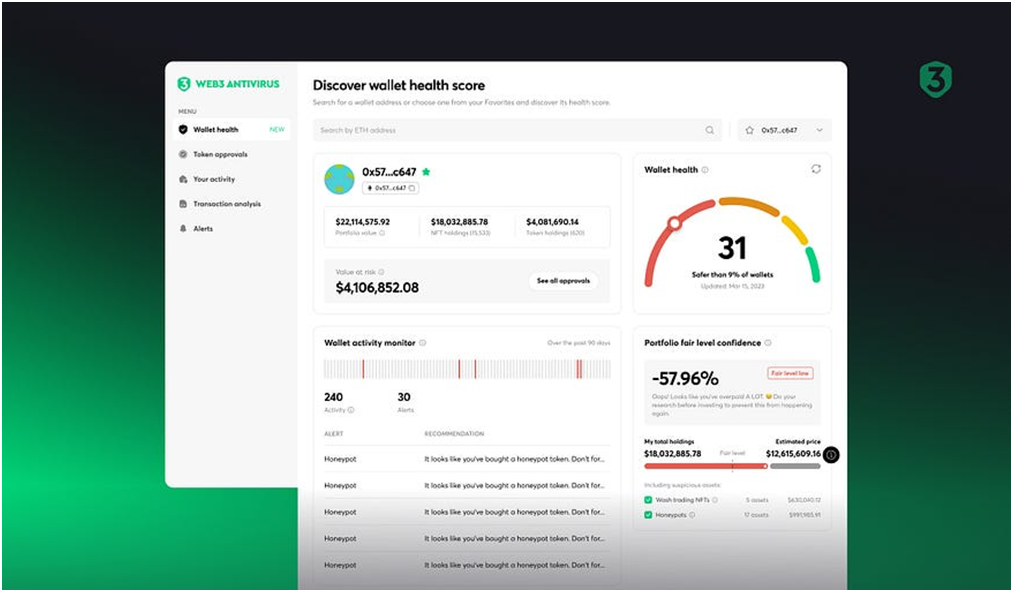
Crypto scams are evolving by the minute to trick a large pool of non-tech-savvy users who are unfamiliar with the intricacies of the blockchain world. Even more experienced users may fall into the scammers’ trap, but browser extension Web3 Antivirus has designed an all-around protection service for Web3 users.
One of the recent crypto scams making waves is the so-called address poisoning. MetaMask warned crypto holders about the scam’s existence earlier this year, but it continues to find new victims. For example, in April 2023, the crypto community discovered that an address poisoning attack resulted in the theft of $1.2 million worth of ARB tokens from more than 600 wallets.
? HACK ALERT: Scammer Steals 933,000 $ARB Tokens Worth $1.3M From Over 630 Wallets Through An “Address Poisoning” Scheme ???#ARB #Arbitrum #Airdrop #Crypto #cryptocurrency #cryptomarket pic.twitter.com/RW6xmmRqhE
— Ajay Kashyap (@EverythingAjay) March 31, 2023
What is address poisoning and how does it work?
This type of cryptocurrency scam targets crypto wallet users. The attacker manipulates a user’s transaction history by creating a wallet address closely resembling the victim’s, with the intention to confuse them. By placing this deceptive address into the user’s transaction history, they trick them into sending funds to the wrong account. This method takes advantage of the long, complex nature of wallet addresses and the general practice of users to only confirm the first and last few characters.
The attackers start by identifying victims and creating new, similar addresses using vanity address generators, which enable attackers to choose a part of an address to make it less random. The scam unfolds as they send a small value of crypto or zero-value tokens from the spoofed address to the victims’ addresses. Eventually, victims end up believing that their transaction history is legitimate. At least some of the targeted users will accidentally copy the deceptive address for subsequent transactions. This results in assets being sent to the attacker’s address instead of the intended recipient’s.
While this attack doesn’s compromise private keys or asset safety, it can lead to significant financial losses and erosion of trust within the crypto community. As of today, these scams predominantly target Ethereum and EVM-compatible blockchains.
This Web3 security tool mitigates address poisoning risks
The good news is that novice crypto users have reliable tools that can protect them from dealing with fake addresses. One of them is Web3 Antivirus (W3A), a browser extension that can help crypto users detect potential scams in real time. The latest version of the tool, 0.9, improves protection against address poisoning and introduces new features to help users trade and transfer crypto in a safe environment.
The new version ensures that users are alerted of any address poisoning attempts. If detected, the extension displays a warning, and users can follow through to the Alert History page for recommended steps to nullify the attack. The tool also alerts users of other types of scam addresses, like fake “0x00..00” ones. These are fraudulent addresses, posing as harmless null addresses, with the intent to trick users. With version 0.9, W3A instantly alerts users about these imposters, providing a timely warning to prevent any unfortunate transaction.
Source: 
Easy and accessible wallet security monitoring
On top of that, the wallet health score calculation has been improved. Users can now assess their wallet’s security level based on three parameters: token approvals, exposure to poisoning attacks and percentage of wash-traded assets stored in the wallet. This score is displayed as a curve divided into four colored sections, from red (low security) to green (high security). Additionally, users can also compare their wallet health score to others.

Source: 
Constantly improving on crypto security
Moreover, the 0.9 version introduces a security referral program. Users can share their exclusive referral link to enter a competition with a prize pool of $150 in Ether (ETH). Additionally, each referral gets a free month of W3A Premium, which offers extended functionalities and services.
Web3 Antivirus’ detection mechanisms are constantly being refined to identify even the most complex scams and vulnerabilities. By simply monitoring alerts and transaction parameters displayed by W3A, crypto users can stay safe.
W3A is an integral tool for any crypto user’s arsenal, with its real-time analysis of smart contracts and transactions. It integrates with multiple browsers, including Chrome, Firefox, Edge and Brave. The tool has already identified thousands of dangerous smart contracts and blocklisted over a million websites.
Learn more about 
Disclaimer. Cointelegraph does not endorse any content or product on this page. While we aim at providing you with all important information that we could obtain in this sponsored article, readers should do their own research before taking any actions related to the company and carry full responsibility for their decisions, nor can this article be considered as investment advice.



Leave A Comment